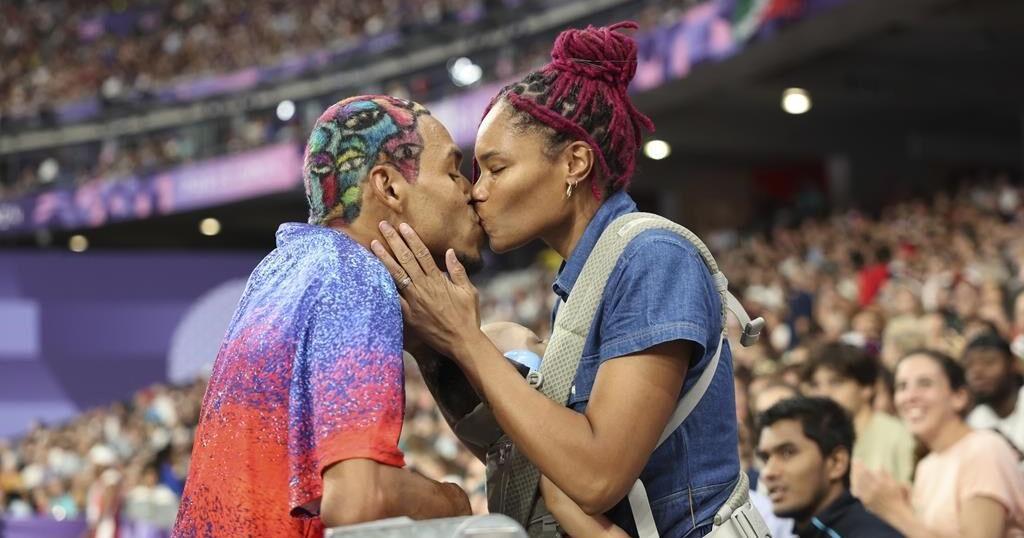PARIS (AP) — Gold medal-winning high jumper Roderick Townsend and U.S. flag bearer and sitting volleyball star Nicky Nieves took different routes to the Paris Paralympics.
But they agree that, given a dip in diverse representation among Paralympians compared to Olympians, there is untapped athletic talent among Black people and other people of color with disabilities. The reasons for that, they say, include money, the stigma of identifying with a disability, and proximity to para clubs where they can train.
“I want us to be as represented as much as possible,” Nieves said. “I’m a firm believer of, ‘If you can see her, you can be her.’”
Roster material provided by the U.S. Olympic and Paralympic Committee shows that the percentage of of the American Olympic team this year that identified as white was 64%, and that 68.6% of the Paralympic team identified as white.
The data for the rest of each team also included people who identified as Black or African-American; Asian; American Indian or Alaskan Native; Native Hawaiian or other Pacific Islander; two or more races; other; or, prefer not to say.
Black athletes made up 17.8% of the Olympic roster and 12.7% of the Paralympic team, the second-largest group in each case. In whole numbers, that translated into 28 athletes on the Paralympic squad’s smaller roster of 220 athletes. There were 106 athletes on the Olympic team who identified as Black, including some of the United States’ biggest stars.
By comparison, for people who identified as just one race in the 2020 census, 61.6 % said they were white alone while 12.4% identified as Black or African-American alone.
Watching the teams in competition can offer a little bit of insight as to who is playing which sport. More than a dozen athletes on the Paralympic track and field team are people of color, for instance.
The roster for men’s wheelchair basketball, meanwhile, includes two Black players, two-time gold medalists Brian Bell and Trevon Jenifer.
“I would say it’s something I noticed,” Nieves’ teammate, Whitney Dosty, said. “And reasoning — I can’t put my finger on it.”
But sprinter Brittni Mason, a silver medalist in Paris, pointed to one reason for the difference – money.
“Every athlete’s completely different based on sponsors, how long they’ve been in the sport. (Financials) are definitely a hurdle,” she said. “Not everyone’s making all these glamorous incomes.”
Paralympians say they do what they have to do to stay competitive. Townsend and his wife, Tokyo Games Olympian Tynita Townsend, relocated from Louisville to Arizona because of a better sports culture and access to facilities. Nieves uses funds from the Challenged Athletes Foundation to cover travel expenses for training related to para competition.
In 2017, the Centers for Disease Control estimated that one-in-four Black people have a disability. For white people, the number was one-in-five.
And in 2023, a White House briefing document said the highest poverty rate for Black people with disabilities sat at 36%, “the highest among any group.” Taking into account that disability care expenses already are costly, that makes it harder for families with a disabled person to spend more for either able-bodied or para-sport aspirations.
Para clubs often are not as accessible as clubs for people without disabilities. Athletes sometimes have to move or travel just to find a local para club.
“I’ve lucked out, being able to be close to, like a semi Paralympic-Olympic training center in Alabama, Lakeshore Foundation,” Bell said. “Most people are not able to have those type of facilities, like just right in their backyard. So I was definitely fortunate in that regard.“
Townsend was a decathlete at Boise State for two years, where he won all-conference honors. He said the stigma “definitely” exists in the Black community — the impact of which is a person may feel like they will miss out on opportunities by identifying disability.
“Nobody would’ve blamed me if I said, ’Hey, I just want to pursue an Olympic career,” said Townsend, who has an upper right shoulder impairment after sustatining nerve damage at birth. But he’s glad he decided to go the para sport route. “I would have missed out on making so many connections, touching so many lives and helping so many people had I not stepped aside and looked at the bigger picture.”
Though Nieves is using her platform to speak out to people of color, there’s sometimes not enough opportunity for people from minority communities to realize that para sport is an option.
Townsend and Mason told similar stories of being discovered by someone seeing them compete in able-bodied track and noticing an impairment. Mason said she “probably” wouldn’t have run if that person didn’t reach out. Sprinter Ryan Medrano, also a silver medalist, found out about the games through fellow CBS’ “Survivor” participant and para long-jumper Noelle Lambert.
While the economic side is a hurdle for aspiring para athletes, Paralympians continue to use their voice to grow their game.
“It is just as much about exposure and finding” para sports, Townsend said. “When I make these calls to other young athletes, it’s very important to be able to spread that awareness.”
As the 2024 Paralympics conclude and Team USA readies for the Los Angeles Games in 2028, an opportunity to get more Black athletes playing para sports exists. Athletes recognize this opportunity.
“We’re going to see a lot of representation from a lot of demographics,” Townsend said. “I believe that there will be a wealth of information in those communities specifically.”
___
Avery Hill is a student in the John Curley Center for Sports Journalism at Penn State.
___
AP Paralympics:

























